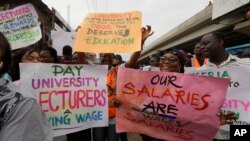A nationwide labor protest in Nigeria spread to the capital, Abuja, on Wednesday, as protesters sought to pressure authorities to resolve a payment dispute with university teachers.
The lecturers walked out of classes Feb. 14 over the dispute and an unfulfilled government promise to invest $500 million in public universities. The strike has affected millions of Nigerian students.
Thousands of protesters comprising Nigerian workers from various sectors marched to the national assembly on the second day of a solidarity protest for the Academic Staff Union of Universities or ASUU.
The joint protest aims to pressure authorities to address lingering funding issues in public universities that prompted a lecturers' strike five months ago.
But protesters said there are other issues, like insecurity and the state of Nigeria's economy, that also need urgent attention.
Nigeria Labour Congress (NLC) President Ayuba Wabba said these issues stem from years of authorities neglecting the education system.
"The children of the working class, the children of the less privileged have been at home for the past five months and nobody cares, whereas their children are graduating daily from universities abroad and they have the audacity to post them on social media so that we can see,” Wabba said. “Once you deny citizens education, you have denied them everything."
More than 8 million students in Nigeria's public universities are affected by the strike including protester Adamu Umar, who is an undergraduate student of the Ahmadu Bello University.
"I'm almost getting to the point that I cannot tolerate anything from the Nigerian government anymore,” Umar said. “I gained admission in 2019, I am supposed to be a graduate by now."
University lecturers abandoned classrooms on Feb. 14 after an unsuccessful meeting with education authorities to honor a 2009 promise made by the government to invest $500 million dollars into public universities.
Nigeria’s public universities are said to be suffering from low funding and poor management. Many also lack adequate facilities.
The protesters say Nigerian lecturers' renumeration is low compared to their counterparts abroad.
Emmanuel Osadeke, chairman of the Academic Staff Union of Universities labor union, said authorities tried to punish the striking lecturers by not paying salaries during the strike.
"The first thing they did was to go and stop salaries instead of resolving the issue thinking that with two or three months we'll come begging,” Osadeke said.
Instead, Osadeke said, the resilience of his union members could keep the strike going much longer.
“We must change the Nigeria university system no matter what happens,” he said.
Some lawmakers responded to protesters on Wednesday and asked that they give authorities some more time to pay the promised money.
In February, authorities said they had paid $230 million out of the $500 million agreed to.
The Nigerian Labour Congress represents millions of workers across various sectors, including lecturer unions.
A similar strike in 2020 lasted for nine months.





